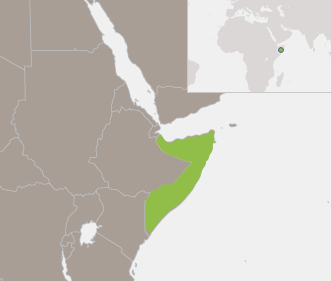About a week ago, the Reuters news agency reported on the movement of al-Shabaab militants from the south of the country to the semi-autonomous region of Puntland in the north. Embattled Shabaab fighters fleeing the onslaught of Kenyan, Ethiopian, and Ugandan troops in the south is certainly nothing new, and the timing of the article probably had more to do with a visit by the EU Special Envoy to Puntland’s capital of Garowe than any spike in the trend.
When I was editor of the independent news website Somalia Report, we would routinely hear rumours of al-Shabaab fighters fleeing to Puntland’s Galgala hills from the south, and even as far as Yemen. Probably the most credible report we received came this past January, when clan elders along Puntland’s northern coast claimed to have spotted 12 skiffs carrying 80 Shabaab militants heading to the Yemeni port of Zinjibar, at the time partially under the control of al-Qaeda, with whom al-Shabaab is allied. Despite being backed up only by the usual hodgepodge of eyewitness accounts that fuel much Somali news, the elders’ story made some sense. With the impending military defeat of al-Shabaab in the south and the looming loss of their major port, Kismayo, to invading Kenyan forces, the Shabaab leadership was securing an escape route.
Many of the group’s top leaders belong to its extremist transnationalist faction—those supporting a global Islamist agenda—and do not come from the southern clans, and are therefore not overly comfortable relying upon the hospitality of the (nationalist) Rahanweyne-clan fighters who make up the bulk of southern Shabaab forces.
The additional advantage of a northward migration was to keep a clean line of communication open with al-Qaeda in the Arabian Peninsula (AQAP), which operates in southern Yemen.
The presence of al-Shabaab in the north is not a recent phenomenon; the Puntland government has been battling a Shabaab-linked insurgency in the Galgala hills, led by arms smuggler Mohamed Said Atom, since 2010. However, the future importance of the northern bastion had become clear by February of this year, when al-Shabaab took direct control of Atom’s organization and announced the appointment of a new leader of the insurgency, Yassin Kilwe, with theretofore London-based cleric Abdikadir Ali Mumin as his deputy. The Galgala “chapter” has since expanded to the Golis mountain range, which runs west of Bosaso along Puntland’s northern coast.
Puntland President Abdirahman Farole, who was elected in January 2009, has been remarkably successful in transforming himself from a tribal chief of a fiefdom on the point of collapse to a statesman at the head of a quasi-independent state (a visit to Puntland by an EU Special Envoy in 2008 would have been unimaginable). Farole’s rise to international legitimacy has been partially on the back of a successful PR campaign detailing both the severity of Somali piracy and his administration’s efforts to combat it—from the clampdown on the once-pirate capital of Eyl to the creation of the now defunct Puntland Marine Police Force (PMPF)—a 1000-strong task force funded by the UAE—and Puntland’s raids against pirate strongholds near the coastal town of Garacad.
Now that pirate attacks have dwindled, primarily due to the increased deployment of armed guards aboard commercial vessels, Farole has turned to another international bugaboo: Islamic militancy. In the Reuters article, he estimates the number of al-Shabaab fighters in Puntland at 400, which would place the force at about one-tenth the strength of Puntland’s militia, the Darawish. Given Farole’s interest in boosting Puntland’s international relevance the figure seems understandably inflated, though by no means outside the realm of possibility.
Once again, Puntland lies at the centre of an issue of global import, and once again the Puntland president is doing his very best to make the rest of the world aware of it. And who can blame him?
Jay Bahadur is an Associate for the Security Governance Group.
Tags: Al-Shabaab, Puntland, Somalia






 Visit the Centre for
Visit the Centre for